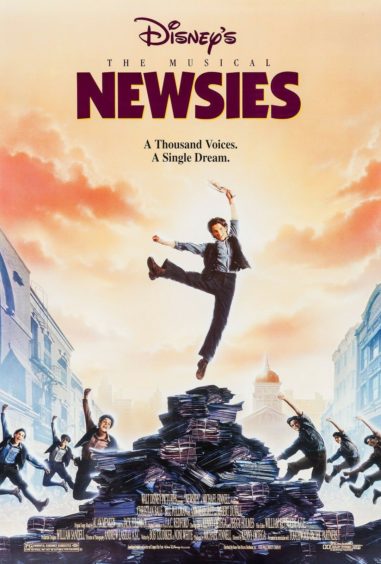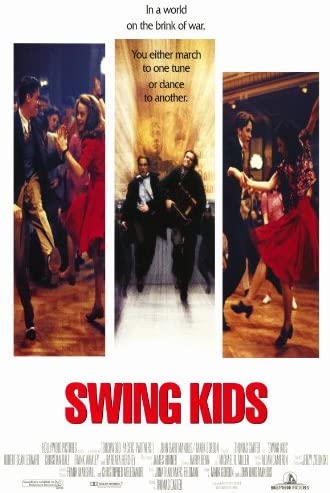Disney in the early nineties: an entire book can be written on the Mouse Factory’s output back then (the closest to which that exists is Kim Masters’ notorious 2000 expose KEYS TO THE KINGDOM), which isn’t anyone’s idea of good, but is of definite interest to cult movie buffs.
Understand, I’m referring to Disney’s live action offerings. Its animated output is iconic enough that it has its own classification system but its live action releases don’t, although if the nineties represented the “Renaissance” era of Disney animation, its live action features can be said to more closely resemble the “Bronze Age,” i.e. a much darker, more uncertain period.
It was in the early portion of the decade that Disney, under the tutelage of CEO Michael Eisner and chairman Jeffrey Katzenberg, put out questionable fare like MY FATHER THE HERO (1994), a remake of the French comedy MON PERE CE HEROS (1991). About a teenage girl (14-year-old Katherine Heigl) staying at a scenic resort who attempts to win over a cute boy by pretending she’s a prostitute and her father (Gerard Depardieu) a pimp, the most shocking thing about the film is that it’s a pretty straight transposition of the adult-oriented original, yet was sold as a “family” comedy. There was also THE PROGRAM (1993), a relatively innocuous sports drama that caused an uproar when several kids, in an apparent imitation of one of its more attention-getting scenes, were run over in the middle of a busy intersection, resulting in some radical surgery on the film (something I, who was working as a projectionist at the time, remember quite well, having had to break down the pic a week or two into its  run to be shipped back to Disney, who returned it the following morning with the offending scene excised).
run to be shipped back to Disney, who returned it the following morning with the offending scene excised).
Then there was Disney’s ambitious pairing of NEWSIES (1992) and SWING KIDS (1993). Both starred a young Christian Bale, coming off an acclaimed turn in Steven Spielberg’s EMPIRE OF THE SUN (1987). The fact that Bale’s career survived that film (a notorious flop) and this deadly duo proves he has definite staying power.
More importantly, NEWSIES and SWING KIDS represented something Hollywood had been attempting to do for decades: they sought to resurrect the old timey movie musical format. The 1960s had FINIAN’S RAINBOW (1968) and PAINT YOUR WAGON (1969), the seventies AT LONG LAST LOVE (1975) and the eighties BERT RIGBY, YOU’RE A FOOL (1989). The nineties may have contained Hollywood’s most concerted effort yet at reviving the musical, with NEWSIES and SWING KIDS representing the midpoint of a four film trajectory that began with the Bette Midler vehicle FOR THE BOYS (1990) and concluded with what is arguably the most notorious musical flop of them all: James L. Brooks’ I’LL DO ANYTHING (1994).
Getting back to NEWSIES, it’s a determinedly old fashioned depiction of singing and dancing orphans who delivered newspapers in NYC, circa 1899. The film apparently began as a straightforward screenplay about the newsies and a strike they organize against their corrupt superior Joseph Pulitzer (Robert Duvall), which is retained in the finished film, but amid a lot of crummy songs.
Director Kenny Ortega was known as a choreographer back in ‘92; he’d go on to helm HOCUS POCUS and the HIGH SCHOOL MUSICAL flicks, but was relatively inexperienced when he made NEWSIES. That’s evident in the patently fake looking sets, synthetic atmosphere and equally synthetic anti-corporate sermonizing. This sort of thing might impress certain internet “radicals” (i.e. those who proclaim JOSIE AND THE PUSSEYCATS and SPEED RACER “subversive masterpieces,” evidently missing the fact that those films are quintessential manifestations of the corporate mentality they purport to oppose), but the sentiment is as fake as the forced happy ending, in which Bale somehow manages to strike a blow against Pulitzer and become part of his organization.
NEWSIES has accrued a cult following in recent years (and became a most unlikely stage hit), but was roundly rejected by audiences. Its failure may well have had an influence on SWING KIDS, released the following year by Disney’s Hollywood Pictures division. Like the previous film, it purports to be a serious expose of real life issues, in this case a group of youthful swing dancing enthusiasts in Nazi Germany. The feature directorial debut of Thomas Carter, a veteran of episodic television back then (and since), it’s not a musical per se, but I’m not sure that was by design on the parts of Carter and his collaborators.
may well have had an influence on SWING KIDS, released the following year by Disney’s Hollywood Pictures division. Like the previous film, it purports to be a serious expose of real life issues, in this case a group of youthful swing dancing enthusiasts in Nazi Germany. The feature directorial debut of Thomas Carter, a veteran of episodic television back then (and since), it’s not a musical per se, but I’m not sure that was by design on the parts of Carter and his collaborators.
This is to say that the film clearly underwent a fair amount of post-production meddling. The late Roger Ebert wrote in his review that “One can only speculate on what kinds of compromises went into the making of this film.” Some pretty sizeable ones, evidently! For a comparison see the aforementioned I’LL DO ANYTHING, an unabashed musical that after test audiences reacted negatively ended up an unsatisfying song and dance free dramedy. I’m guessing there was a lot more dancing, and possibly singing, in the original cut of SWING KIDS, but it was evidently pared back severely, leaving us, a la I’LL DO ANYTHING, with an unsatisfying film.
Christian Bale here plays one of the Swing Kids. He’s supported by Robert Sean Leonard and Frank Whaley as fellow Swingers, Barbara Hershey as Leonard’s mother and Kenneth Branagh as a Nazi official. None are too convincing as Germans, although that complaint can be overlooked (if SCHINDLER’S LIST and the Spanish DEBAJO DEL MUNDO can be forgiven for portraying non-German actors as Nazis than this film can too). What’s harder to forgive is the perfunctory nature of the proceedings, which suffer from a severely abrupt and unsatisfying conclusion that utilizes a title card to explain what became of the Kids (basically, we’re informed that some died in camps and some didn’t); that, incidentally, is a telltale sign of studio interference, often due to low audience test scores (another is voice-over narration, which SWING KIDS foregoes).
Of the dark realities of Nazi Germany we get a very subdued depiction, with the Swing Kids more upset about the disruption of their dancing than the atrocities committed by the Nazis. It’s hardly surprising that SWING KIDS was completely overshadowed in the Americanized Nazi movie field by SCHINDLER’S LIST (which premiered a few months after this one), and in the music field by the retro-musicals of the 00s.
The latter included MOULIN ROUGE (2001) and CHICAGO (2002), one of which was actually successful (financially, that is), and soundly overshadowed the floppage of SWING KIDS (which was further obliterated by the 2018 South Korean film of the same name, a vastly superior effort in every conceivable respect), as well as NEWSIES, PAINT YOUR WAGON, AT LONG LAST LOVE and BERT RIGBY, YOU’RE A FOOL. Obviously that doesn’t mean those films are completely gone, but they are forgotten, and rightfully so.
